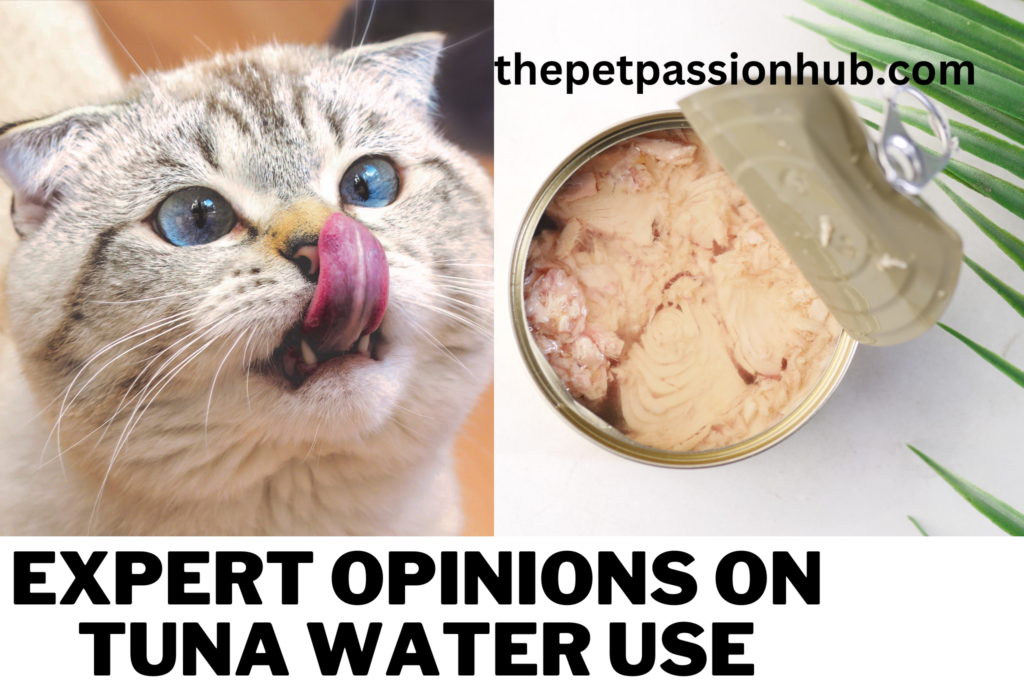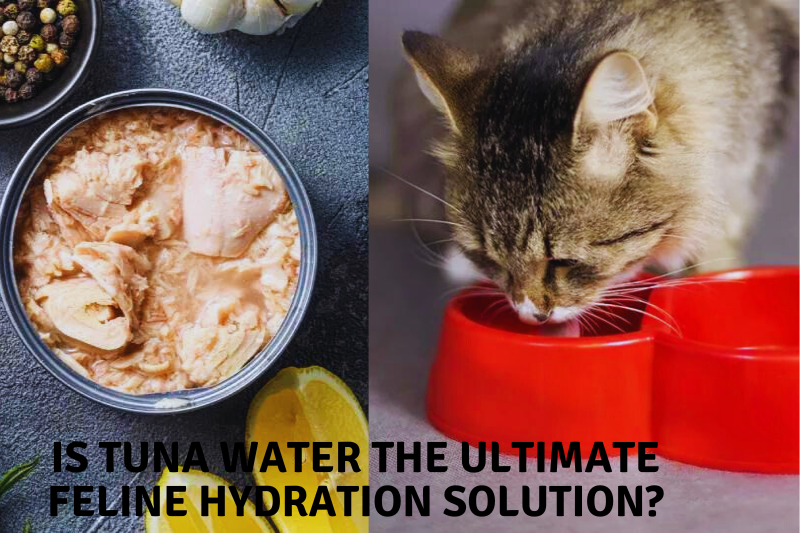Introduction
Are you tired of trying to coax your feline friend into drinking enough water? Have you ever considered tuna water as the ultimate solution to keep your cat hydrated and healthy?
Imagine a world where your finicky feline eagerly laps up every last drop of this savory liquid. Providing them with essential hydration without the struggle.
This article will delve into the potential benefits of tuna water as a novel approach to feline hydration. Exploring its appeal to cats and its potential health implications.
Let’s embark on a journey through the curious world of tuna-infused hydration. And unravel whether it could be the game-changing solution for ensuring your beloved cat stays adequately hydrated.
Is Tuna Water the Ultimate Feline Hydration Solution?
Exploring Feline Hydration Needs
As cat owners, we often find ourselves pondering over the best ways to keep our feline friends properly hydrated.
Understanding the unique hydration needs of cats is crucial in ensuring their overall health and well-being.
Cats, by nature, have a relatively low thirst drive compared to other animals. Stemming from their evolutionary history as desert-dwelling predators.
This has shaped their drinking habits, often making them more prone to dehydration than we might realize.
In recent years, the topic of using tuna water as a means to improve feline hydration has garnered significant attention.
Tuna water offers a variety of benefits for cats, including its enticing aroma. And taste that can encourage even the pickiest of drinkers to consume more fluids.
Additionally, tuna water provides essential moisture that can assist in maintaining optimal kidney function. And preventing urinary tract issues in cats.
Understanding how this unconventional approach may impact our understanding of feline hydration is crucial. As we seek innovative solutions for keeping our beloved pets healthy and happy. Is Tuna Water the Ultimate Feline Hydration Solution?
Understanding Tuna Water
If you’ve ever opened a can of tuna, you’ll know that it’s often accompanied by a sizable amount of watery brine.
This liquid gold, known as tuna water or tuna juice. It has gained attention for its potential benefits as a hydration solution for cats.
But what makes this unassuming liquid so appealing to our feline friends? The answer lies in the irresistible scent and taste of the diluted fish juices. Which can entice even the pickiest drinkers.

Tuna water offers an enticing way to encourage hydration in cats who may be resistant to drinking plain water.
Its strong aroma and flavor can pique their interest and motivate them to consume more fluids throughout the day.
However, while it may be an effective short-term solution for increasing fluid intake. It’s essential to ensure that tuna water is not used as a long-term substitute for fresh water due to its high salt content.
Moderation is key when incorporating tuna water into your cat’s diet – perhaps as an occasional treat or mix-in with their regular drinking supply.
Understanding Tuna Water appeal lies in recognizing it as both an indulgent treat and a practical method for promoting hydration among finicky felines.
As always, consulting with your veterinarian about your cat’s specific dietary needs and preferences can help guide your decisions on incorporating tuna water into their routine.
Can Cats Drink Tuna Water? Vet-Approved Nutritional Facts
Pros and Cons of Tuna Water for Cats
For cat owners looking for a hydrating treat for their feline friends, tuna water seems like a convenient and appealing option.
One of the main pros of offering tuna water to cats is that it can encourage them to drink more, especially if they are picky about their water intake.
The strong aroma and flavor of tuna can entice even the most reluctant drinkers, helping to keep cats well-hydrated.
Additionally, tuna water provides essential nutrients, such as omega-3 fatty acids, which can benefit a cat’s overall health.
However, there are potential downsides to consider when using tuna water as a hydration solution for cats. Excessive consumption of tuna water can lead to an imbalance in a cat’s diet due to its high salt content and potential mercury contamination.
Furthermore, some cats may develop an overreliance on tuna water for hydration and become disinterested in drinking plain water.
It’s important for cat owners to use tuna water sparingly and ensure it supplements rather than replaces their pet’s regular water intake.
Cat’s Toothless Smile Will Melt Your Heart. Surprising truth!
Alternative Hydration Solutions for Cats
When it comes to keeping your feline friend hydrated, it’s important to consider alternative hydration solutions beyond just water.
One such solution is offering low-sodium chicken or beef broth as a treat for your cat. Not only does this provide hydration, but it also adds a delicious flavor that may entice picky drinkers.
Another interesting alternative is using specially formulated “cat milk,” which is lactose-free and rich in moisture.
This can be especially helpful for cats who are lactose intolerant or simply don’t enjoy drinking regular water.
It’s important to remember that cats have different preferences when it comes to hydration, so experimenting with various alternatives can lead to finding the perfect solution for your fur baby’s needs.
In conclusion, while tuna water may be a popular hydrating option for cats, exploring other alternatives such as broth and specialized cat milk can offer unique benefits and cater to individual feline preferences.
By considering these alternative hydration solutions, you can ensure that your cat stays properly hydrated and happy.
Expert Opinions on Tuna Water Use
The benefits of using tuna water as a feline hydration solution have been a topic of debate among experts in the field.
While some argue that the appeal of tuna juice may encourage cats to drink more, others caution against relying on it as the primary source of hydration for cats.
Dr. Sarah Wilson, a veterinarian specializing in feline nutrition, believes that while offering tuna water can be beneficial in encouraging reluctant cats to drink, it should not replace fresh water altogether.

She emphasizes the importance of understanding individual cat’s drinking habits and preferences to ensure adequate hydration.
Renowned animal behaviorist, Dr. Michael Chan, offers an interesting perspective on the matter by suggesting that incorporating small amounts of tuna juice into a cat’s diet can be valuable for promoting overall fluid intake.
However, he stresses the need for moderation due to potential health risks associated with excessive consumption of fish-based products in felines.
In light of these expert opinions, it is crucial for cat owners to approach the use of tuna water judiciously and consider their pets’ unique needs and dietary requirements when introducing it as a hydration supplement.
The Impact on Feline Health and Behavior
The impact of feline health and behavior is multifaceted when it comes to their diet, and tuna water could play a pivotal role in addressing these aspects.
Feline health can influenced by the types of nutrients they consume, and tuna water offers hydration along with essential Omega-3 fatty acids that support heart and kidney functions.
Additionally, the presence of taurine in tuna water enhances vision, digestion, and overall immune system performance in felines.
Behaviorally, cats known for being picky eaters, but offering them tuna water may encourage increased fluid intake due to its appealing taste.
Proper hydration can also affect mental acuity and temperament—keeping cats alert, active, and engaged.
Furthermore, incorporating variety into a cat’s diet through tuna water can stimulate their interest in meal times while ensuring they receive necessary nutrients.
Conclusion: Is Tuna Water the Best Choice?
In conclusion, while tuna water may seem like an appealing option for hydrating your feline friend, it’s essential to consider the potential drawbacks. Is Tuna Water the Ultimate Feline Hydration Solution?
Although cats attracted to the strong scent and taste of tuna water, it can lead to excessive sodium intake, which can be harmful to their health in the long run.
Additionally, overconsumption of fish-based products has linked to potential mercury exposure in cats, posing a serious risk to their well-being.
Ultimately, the best choice for feline hydration lies in providing clean and fresh water daily.
While it may not have the enticing aroma of tuna water, plain water is a reliable and safe way to ensure your cat stays hydrated without any potential health risks.
By prioritizing their well-being over momentary enjoyment, you can make an informed decision that supports your cat’s long-term health and happiness.
FAQs
Q1: What is Tuna Water?
A1: Tuna water is the liquid drained from canned tuna.
Q2: Is Tuna Water safe for cats to drink?
A2: Yes, tuna water is safe for cats to consume in moderation.
Q3: Can Tuna Water be used as a hydration solution for cats?
A3: Tuna water can be used as a supplement to encourage cats to drink more water.
Q4: How much Tuna Water should I give my cat?
A4: A small amount of tuna water, no more than a tablespoon or two, can be given as an occasional treat.
Q5: Are there any risks associated with feeding Tuna Water to cats?
A5: Excessive consumption of tuna water can lead to mercury exposure and should be avoided.
Q6: Can Tuna Water replace regular drinking water for cats?
A6: No, it should not replace fresh clean water in your cat’s diet.
Q7: Are there alternatives to using Tuna Water for feline hydration?
A7: Yes, providing fresh water and wet food are also effective ways to keep your cat hydrated.
Q8: Should I consult a veterinarian before giving Tuna Water to my cat?
A8: It’s always best to consult with a veterinarian before introducing new foods or supplements into your cat’s diet.
